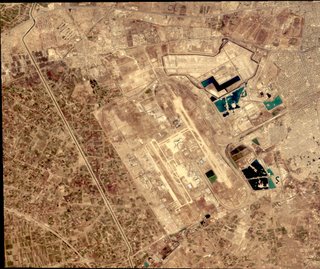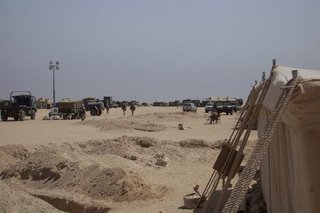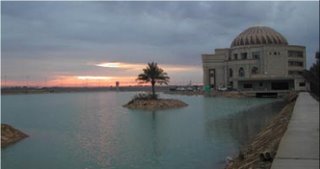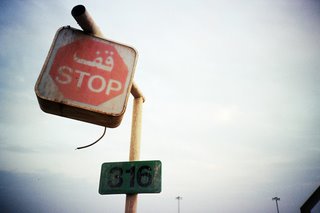Baghdad Airport, The Green Zone and Occupation Garrisons 2003
Baghdad Airport, The Green Zone and Occupation Garrisons 2003
The deliberate obfuscation of permanent bases in Iraq by the US and UK governments illustrates the myth of “freedom of information.” Many of the US bases in Iraq already have, or are now building, facilities which will keep the US government – if not the Iraqi people – happy for the foreseeable future.
US Bases in Iraq will be a researched study of the possible ‘permanent’ bases1 which have been mentioned in various articles over the last three years. All bases had/have US names, as if they were next door to Walmart in Washington, D.C. – crass insensitivity to the rest of the world’s right to existence.
Part I contains research of the US bases in and around Baghdad Airport.
THE BAGHDAD INTERNATIONAL AIRPORT COMPLEX
“Baghdad International Airport (formerly Saddam International Airport) has been refurbished and repaired as part of a $17.5 million contract from USAID to SkyLink to rebuild Iraqi airports in Baghdad, Basr and Mosul.” A new Burger King caters for American troops at the airport.
The airport has two runways. The airport terminal and ONE runway have now been handed over to the Iraqi government. The second runway is still controlled by the US for its military traffic. In 10.04, Parsons received a contract for the construction of “buildings near Baghdad airport.”2 Custer Battles was recently found to be liable for fraud concerning a $16m contract for securing Baghdad airport.
“Route Irish”, which connects Baghdad airport to central Baghdad, is considered “one of the most dangerous roads in the world.” The Italian journalist, Giuliana Sgrena, was wounded here in 2005, whilst her security guard, Calipari, was murdered. Their case remains unresolved.
In November ’05, a video appeared on the web showing Iraqi civilian cars ‘allegedly’ being shot at by Aegis Defence Services members … a practice known previously by the Pentagon, it is reported. AEGIS,3 run by CEO Tim Spicer, is a “British firm responsible for a $293 million U.S. Army security contract in Iraq.” Also in November, this firm was named as ‘Small Consultancy Firm of the Year’ for its ‘Operation Matrix.’ Aegis has been under contract to the US Department of Defense since June 2004. The Aegis 2006 Terrorism and Geopolitical Instability Report costs £4,800 plus VAT, should you wish a copy.
Iraq’s Interior Minister, Bayan Jabr Solagh, said, in a report dated 12.04.06, that death squads responsible for sectarian killings in Iraq are not linked to the government but to private security forces.
Bodies of Armed Men, backed with extensive reference material, is a very interesting essay on the various security firms working in Iraq.4 Read here.
+
Around Baghdad airport, there are several US camps which will presumably be dismantled and incorporated into Camp Victory and Camp Liberty. These small camps are: Camp Sather, Camp Dublin, Camp Slayer, Camp Stryker, Camp Victory and Logistics Base Seitz. There are also two known detention facilities: Camp Nana (now said to be closed) and Camp Cropper.
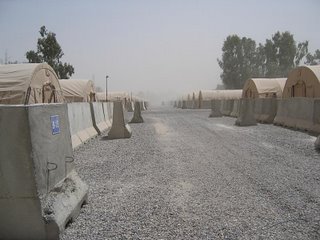
Camp Sather, photo David Warner
Master Sgt. Gerald Johnson, an Air Expeditionary Group fire chief said, “As long as there are aircraft and the people to keep them flying, we will be here.”
13005 airmen lived / worked at this dusty ‘temporary’ base at the West side of Baghdad International Airport in 2003. The Air Force’s air-conditioned tent camp lies within 300 yards of an extremely active flightline. It is inside a larger Army-controlled area. There are trained dogs here, as well as a movie theatre, washers and driers, popcorn machines, air conditioned SUVs, a broadband satellite internet service and a chapel. There is also (2004) an operating theatre in conjunction with the 447th Expeditionary Medical Squadron. Doctors sleep in flak jackets. There is a smaller EMEDS unit designed “to travel with the attacking front … Its entire operating room packs up into one pallet and five backpacks, to be carried by a five-member surgical team … The (30 member) unit’s roster included nurses and flight surgeons, an emergency room physician and specialists including a clinical psychologist, orthopedist and anesthetist… The group was responsible for the medical care of the almost 2,000 Air Force personnel based at the camp.”
According to a newly arrived soldier, Camp Sather and Camp Victory are “hardly more than a stone’s throw apart, but because of a lake and road conditions, it takes about 20 minutes to get from one to the other.” Service men based at Camp Sather are not allowed to leave the airport for Baghdad, or anywhere else.
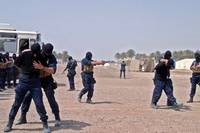
“Members of the SWAT team from Karbala pull suspected “terrorists” from a commercial bus during a training exercise Monday at Camp Dublin, near the Baghdad International Airport.”
Camp Dublin
Parsons was contracted in 11/04 for the construction of training facilities and for the procurement and construction of a shooting house and staging buildings; and in 12/04 for “site preparation, road and groundwork,” as well as for a water supply system and the procurement and installation of an electrical system.
In 2004, “the U.S. military’s Civilian Police Assistance Training Team began rigorous training programs to establish specialized police teams in three areas: Special Weapons and Tactics (SWAT), emergency response, and dignitary protection, similar to functions carried out by the U.S. Secret service. The training team also is responsible for organizing, training, equipping and mentoring the entire Iraqi police force.” Black masks are ‘de rigour.’ Iraqi drop out rate is high.
The suicide of U.S. Army Col. Ted Westhusing was reported at Camp Dublin.
Camp Stryker, FOB Morgan is 10 miles from central Baghdad, and is a base for paratroopers. Reporter Paul McCleary wrote that it “is a place where travel plans go to die … (and said that) Fox News is the only thing carried on military televisions here.” Lindsey Hilsum of Channel 4 News said, “I feel that I have lived in limbo forever.”
“The 48th Brigade Combat Team’s headquarters here is considered the low-rent district,” wrote David Herschman. With a lighter note than the above reporters, he wrote: “There’s food provided by KBR — not Army cooks — and it’s excellent … The tents have full-time electricity and wood-framed doors that cut down on dust and allow soldiers to walk in and out without crouching. There’s Internet access around the clock and AT&T phone service. Indian barbers charge $3 for a haircut, and that includes a neck-snapping chiropractic adjustment.”
The US frown on hiring Iraqis. “Teams of Asian men, mostly hired by Kellogg, Root and Brown, clean the latrines and showers, fix electrical problems, cook the food in the chow hall and run the laundry, recreation facility and the local PX.” For this, one day a month holiday, without pay, is allowed.
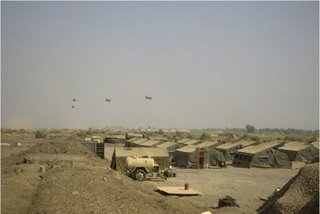
Camp Griffin, photo by “Sir Duck”
Camp Griffin is responsible for radar in the northern 2/3rds of Iraq. (UK responsible for 1/3rd S. Iraq). There is much more information on Camp Griffin in the US civil war than there is on this camp in Iraq.
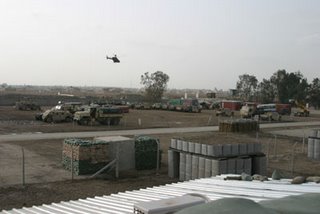 Log Base Seitz, photo Z. Pollon
Log Base Seitz, photo Z. Pollon
The helicopter is hovering over Abu Ghraib prison
N. side of BI Airport. “The Pacesetters and their subordinate units provide supplies, maintenance, fuel, water, showers, laundry, and transportation support to the thousands of soldiers in and around Baghdad, Iraq.”
A woman journalist, Zellie Pollen, blogged about her experiences at Log Base Seitz. “Log Base Seitz was established when relations between Americans and Iraqis were still good enough that soldiers wandered into the town of Abu Ghraib for supplies, they ate in Iraqi restaurants and talked to Iraqis on the streets. Those days are long gone. Now the logistical base is considered by some disgruntled soldiers as a mortar magnet and a buffer zone for the much larger Camp Victory right next door … The worst times are when I stand and listen, over the generators, trucks and soldier noise, to the call to prayer outside the base walls. I can’t reach that Iraq right now, and I know that no one inside could even understand why I would want to … They have no understanding of Iraqis or Iraqi culture outside of framing them as killers and “heathens.” And why would they?” It is a good blog, written with much integrity. Read it.
Camp Thunder
W. Baghdad, a short distance from Abu Ghraib. No info except
- two released Abu Ghraib prisoners spoke from here, and
- Chinook and Black Hawks were fired upon at the Camp Thunder assembly area during ‘Operation Iraqi Freedom’ (sic).
This ‘High Value Detention (HVD) Site’ is a “holding compound surrounded by razor wire. 5 detainees were wounded here following a riot. In August 2005, a new compound was being built. “It will consist of four pads, each approximately 400 by 400 feet and will increase detainee capacity from 163 to 2,000.”
According to Robert Fisk, Amnesty International was refused permission to visit Camp Cropper, where Qais al-Salman was taken to a canvas room with up to 130 prisoners. He was beaten.
A Human Rights First October ’05 Report, 27 Detainee Homicides in US Custody, includes the death of a Camp Cropper detainee, Mohammad Munim al-Izmerly, a 65-year-old chemical scientist. The autopsy found that Izmerly died from a “sudden hit to the back of his head.” It was discovered, according to the BRussels Tribunal list of killed Iraqi academics, that US doctors had made a 20cm incision in his skull. The US Army dismissed a wrongful death claim, saying “the family had presented no evidence of wrongdoing by the US.”
Human Rights First also details the death of Dilar Dababa, an approximately 45-year-old Iraqi civilian detainee, (who) died on June 13, 2003 at Camp Cropper, after being subjected to what press accounts of unreleased Army investigation records describe as “physical and psychological stress” and restraint in a chair during interrogation. Military investigation documents cite an autopsy finding that Dababa died from a “hard, fast blow to the head.”
“The torture inside this camp leads you sometimes to wish you were dead,” said an exiled ex-detainee who was fearful of speaking lest his family in Iraq were harmed.
(See Barton, under Camp Slayer, below)
“Task Force 134 hopes to have some 3,600 Iraqi staff for its three jails trained and ready by the end of this year,” Maj. General Jack Gardner said. “By then Baghdad’s Abu Ghraib should have closed and most of its 4,300 inmates moved to a site nearby at the high-security Camp Cropper.”
The ‘Black Room’ was revealed, and reported to higher authorities as early as 08.03, as a centre for abuse. The New York Times uncovered the grim details on 20.03.06. CentCom has refused to release Brigadier Gen. Formica’s military inquiry into prisoner abuse. Camp Nama was closed in summer 2004, and Task Force 6-26, renamed, was moved to Balad.6 There are more torture rooms yet to be revealed. “Defense Department personnel briefed on the unit’s operations said the harsh treatment extended beyond Camp Nama to small field outposts in Baghdad, Falluja, Balad, Ramadi and Kirkuk.”
Report of torture at Baghdad Airport detention centre.
8.4.04. Yahoo. Iraqi prisoners vanishing in ‘black hole’: Blair envoy
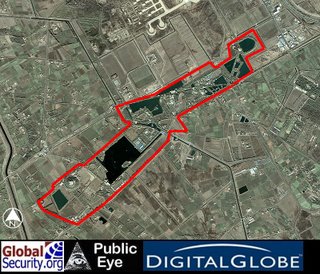 The Palace Complex (airport in white, top centre)
The Palace Complex (airport in white, top centre)
Global Security writes: “There is some considerable confusion on the part of Western intelligence concerning the most appropriate nomenclature for the palace complex that envelopes the airport to the South, East and North. In the DoD Briefing on Iraqi Denial and Deception of Oct. 8, 2002 the Radwaniyah presidential palace was said to be the extensive complex to the East and North of the Airport. Subsequently, the NIMA map of Baghdad assigns this nomenclature to the much smaller palace complex to the South of the Airport. This map assigns the name Abu Ghurayb to the palace to the East of the Airport, while the palace to the North of the Airport is termed “Presidential Palace North” — otherwise known as the Qasr Al-Faw Palace. “
Al – Faw Palace, with lake – once privately owned by Saddam Hussein and now privately occupied by the US – is on the grounds of the Palace Complex. It has a conference centre, pool and 62 rooms – soldiers’ socks can be seen drying in the windows. Very Important People come here and talk about “good news.”
US Camp Victory – al-Nasr, Baghdad has been named as one of the possible future permanent bases in Iraq. It is around 5km from Baghdad International Airport, and 15 minutes from central Baghdad.
Kellogg Root and Brown7 (KRB – a subsidiary of Halliburton) were contracted to supply modular buildings to house dining, living and administrative rooms and install electricity and plumbing. The Pegasus Dining Facility also has “a short-order grill, salad, pizza, sandwich and ice cream bars; … a Burger King stand, and a PX (04.04) which offers … televisions, gas grills, A/C units, microwave ovens, women’s thong underwear and condoms. “ There are also “internet cafes, weight rooms and basketball courts.”
Camp Slayer
“A former Iraqi government palace and amusement complex near the Baghdad airport, featuring man-made lakes filled with carp, was transformed into a logistics and operations base for US intelligence and weapons-hunting teams. The camp has also hosted US eavesdropping and other classified operations. Most of the 1,200 or so troops that have been based here, plus CIA and FBI officials, covert Special Forces teams, civilian experts and others, camp in two dozen or so garish guest houses that line three artificial lakes … As of mid-2004, troops stationed at Camp Slayer had access to running water, functional toilets and showers … and … had access to the internet.”
Rod Barton was sent to Iraq. “At the almost daily briefings at Camp Slayer, the photographs of newly inducted Cropper inmates were regularly displayed.” Details here.
For 52 photographs, see here.
Abu Ghraib (Ghurayb) Palace Complex
Camp Cobra
East of the airport, it “is a chief meeting ground for military and civilian officials and dignitaries.” Self-sufficient medical aid station, satellite internet.
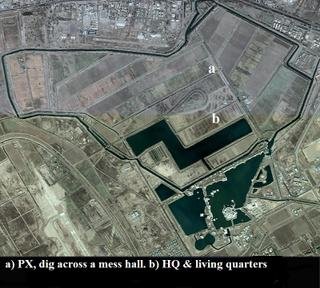 Camp Liberty – Camp al-Tahreer Baghdad, Iraq: From a to b.
Camp Liberty – Camp al-Tahreer Baghdad, Iraq: From a to b.
South of the lake is Victory South
Camp Liberty – Camp al-Tahreer
(formerly Camp Victory North)
Camp Liberty – al Tahreer is another camp mentioned as a US “permanent” base.
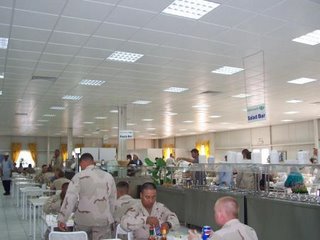 Camp al Tahreer dining facility
Camp al Tahreer dining facility
This camp was once Saddam Hussein’s hunting grounds. The wetlands, presumably home to wildlife, are now gravel. KGB was ‘awarded’ the contract here, too. The Camp is VERY large and divided into three ‘cells’: Camp Blackjack, West Life Support Area (LSA), and Division LSA. Each has a “new chapel, Moral Recreation and Welfare building, PX shoppette, barber shop, internet café, gym, basketball courts and volleyball arenas,” etc. The Camp can be occupied by around 14,000 troops living in an enormous Trailer Park. The largest PX (opened ’04) in Iraq is here. “As of June 2004, Gulf Catering Co. was reported to be the contractor in charge of catering the thrice-daily meals to soldiers stationed at Camp Victory North, inside a massive air-conditioned and new dining facility equipped with two wide-screen televisions.”
In 06.04, Camp Victory North Legal Services Center and Courthouse opened. It houses “a courtroom and enough office space for the Military Justice, Administration, Legal Assistance, and Claims sections.”
The Mother Jones report by Joshua Hammer in 2005 said this base was the size of a “small American city.”
This is in the center of Kadhimiya, Baghdad. This 01.05 article said that about 2000 Iraqis worked here. They served food, interpreted, ran internet cafes, and did maintenance work. In 03.05, Global Security gave more detailed information. FOB Justice was “the headquarters of the Public Order Forces (POF), and held about 250 prisoners. …The POF has a history of torture and abuse and conditions for prisoners (who had no recourse to legal appeal) were said to be poor.” In 05.05, “the administrative duties were transferred to Iraqi forces.” As of 09.05, there were “4,000 Iraqi members and 250 U.S. advisors … There have been problems in electrical wiring, ammunition supplies mortar damage repair, sewage system difficulties and poor quality sleeping quarters.”
The Green Zone
Parsons was contracted to build “T Walls” in 11.04. In the summer of 2005, a Kuwaiti firm was ‘awarded’ the $592m contract for the new US embassy in Baghdad, to be completed by 2007. Built to withstand attack, this Ozymandius on the Tigris, composed of a cluster of 21 buildings, will have “a gym, swimming pool, barber and beauty shops, a food court and a commissary. In addition to the main embassy buildings, there will be a large-scale US Marine barracks, a school, locker rooms, a warehouse, a vehicle maintenance garage, and six apartment buildings with a total of 619 one-bedroom units. Water, electricity and sewage treatment plants will all be independent from Baghdad’s city utilities. The total site will be two-thirds the area of the National Mall in Washington, DC.” It will be the largest US embassy in the world. For that reason, I have included this US Embassy in Baghdad amongst US Bases in Iraq.
For an honest view of the Green Zone and military facilities around Baghdad airport, read the Daily Iraqi Cheese Grader
It is possible that the US might give up some of the smaller tented Forward Operating Bases surrounding the Baghdad International Airport. It seems highly probable that they will keep their grasp on the imperial palaces and expanding US bases within this area for the foreseeable future. These bases could thus be seen as “permanent.”
+
Camp Falcon-al-Sarq and Rashid Airbase are 11 miles southeast of central Baghdad. They are not part of the Baghdad Airport complex and will thus be discussed in US Bases in Iraq, II.
Source Material:
Of paramount importance in the research of US Bases in Iraq is John Pike’s website, www.globalsecurity.org, which forms the bedrock of this research. Within this site, there is a treasure trove, from which one can search for further information: Military Facilities. Permission by John Pike was given for the use of his excellent site.
Other information comes from various websites by ‘embeds’ and bloggers. Bloggers tend to give a more personal approach to the US bases in Iraq.
Footnotes
[1] al-Asad; al Qayyara; al-Taji; Balad Air Base (Camp Anaconda); Bashur; Camp Falcon-Al-Sarq (Baghdad); Camp Fallujuh; Camp Marez; Mosul Airfield; Camp Renegade (Kirkuk); Camp Speicher; Camp Victory/al-Nasr & Camp Liberty / al-Tahreer (Baghdad); (Tikrit); H1, H2, H3; Post Freedom (Mosul); Tallil; Salmon North (Nasiriyah); 3 unknown, one between Irbil & Kirkuk; Al Sahra.
[2] Of interest: cost accounting standards and “foreign Proposal Insurance Questionaire” by AIG Worldsource at this url.
[3] Aegis has acquired Rubicon Int. services and will now also have offices in Saudi Arabia, Afghanistan and the USA. The company expects continued growth in revenues.
[4] US outsourcing Special Operations in Iran and Somalia
[5] 750 in Autumn ’05, according to Global Security.
[6] See Torture and Task Force 121
[7] KRB contract value: $4.5 billion for US base construction and maintenance.
The url to US Bases in Iraq. Part I: Baghdad is: http://indexresearch.blogspot.com/2006/04/us-bases-in-iraq-part-i-baghdad.html
US Bases in Iraq. Part II: Falcon-al-Sarq, Fallujah, Salmon North and Tallil
Sarah Meyer is a researcher living in Sussex, UK.
http://indexresearch.blogspot.com
email: [email protected]


